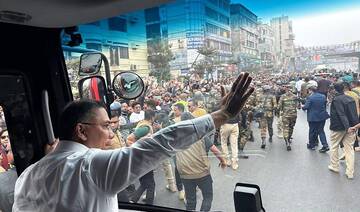LONDON: Tributes have poured in for Amged El-Hawrani, one of the first senior medics in the UK to die after contracting coronavirus.
Colleagues held a minute’s silence on Monday for the ear, nose and throat specialist at Queen’s Hospital Burton.
El-Hawrani, 55, who was born in Sudan, died at Leicester Royal Infirmary on Sunday after testing positive for COVID-19.
Before he fell ill, he had also been volunteering in the accident and emergency units.
Tributes were paid from his family, friends, colleagues and former patients, as people mourned the loss.
His family described him as their “rock” who “always put everyone before himself.”
“Amged was a loving and much-loved husband, son, father, brother, and friend,” the El-Hawrani family said. “His greatest passions were his family and his profession, and he dedicated his life to both. He was the rock of our family, incredibly strong, compassionate, caring and giving.
“He always put everyone else before himself. We all turned to him when we needed support and he was always there for us. He had so many responsibilities and yet he never complained. Amged reached the very top of his profession and we know he made a difference to thousands of lives during his career.”
Dr. Andrew Goddard, president of the Royal College of Physicians, told the BBC that El-Hawrani’s death had hit colleagues “like a train.”
“We knew that Amged was unwell and was receiving support and care in Leicester, so we were all hoping for the best, but in some ways prepared for the worst.
El-Hawrani, according to those close to him, was loved among his colleagues, dedicated to serving his patients, and contributed to raising funds for hospitals. He practiced mountain climbing and climbed the Himalayas with a group of friends a few years ago.
British newspapers quoted the CEO of the medical institution where El-Hawrani worked as saying that they were deeply saddened by the loss of a great and loved colleague.
“It’s brought home to everybody the seriousness of this outbreak and that NHS and social care workers are literally putting their lives on the line.”
El-Hawrani’s death follows that of another medical professional in the UK of Sudanese descent.
Adil El-Tayar, an organ transplant consultant in London, who had also worked in Sudan and Saudi Arabia, was the first NHS surgeon to die in the UK.
He also worked at St. Mary’s and St. George’s hospitals in London during his career and passed away last week at a hospital in the west of the city. He was 63.
British-Sudanese surgeon, Ibrahim Kojan, said that he met El-Tayar while receiving the representatives of the Sudanese Doctors Syndicate in 2007, and he was called “the Sufi Sheikh” for his extreme modesty. Kojan said on his Facebook page that El-Tayar worked within the Association of Sudanese Surgeons in England to help Sudanese surgeons continue their training in the UK and Sudan.
Kojan said that El-Tayar was a fellow of the International College of Surgeons and that he received full support from the college for kidney transplantation and kidney research in Sudan.
“Unfortunately, he could not achieve what he wanted due to the opposition he faced from the Sudanese Ministry of Health and the Medical College during the 2008 Salvation rule.” he added
Kojan said this was attributed to the greed of both institutions which were after getting the money, and that prevented the project from being implemented on behalf of either institution.
He said: “El-Tayar is one of the noblest and most sincerest of the people I met in our field, which at times resembles a football field in which young boys quarrel.
El-Hawrani’s death could reverberate among NHS staff, the British Medical Association (BMA) warned, as concern grows over the lack of protective equipment.
“Doctors fear that they may have to make hugely difficult choices about whether to continue to care for patients where adequate personal protection is insufficient or unavailable,” Dr. Rob Harwood, from the BMA, said.
















